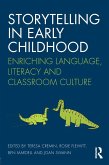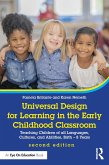Vygotsky's Theory in Early Childhood Education and Research (eBook, PDF)
Russian and Western Values
Redaktion: Veraksa, Nikolay; Sheridan, Sonja
38,95 €
38,95 €
inkl. MwSt.
Sofort per Download lieferbar

19 °P sammeln
38,95 €
Als Download kaufen

38,95 €
inkl. MwSt.
Sofort per Download lieferbar

19 °P sammeln
Jetzt verschenken
Alle Infos zum eBook verschenken
38,95 €
inkl. MwSt.
Sofort per Download lieferbar
Alle Infos zum eBook verschenken

19 °P sammeln
Vygotsky's Theory in Early Childhood Education and Research (eBook, PDF)
Russian and Western Values
Redaktion: Veraksa, Nikolay; Sheridan, Sonja
- Format: PDF
- Merkliste
- Auf die Merkliste
- Bewerten Bewerten
- Teilen
- Produkt teilen
- Produkterinnerung
- Produkterinnerung

Bitte loggen Sie sich zunächst in Ihr Kundenkonto ein oder registrieren Sie sich bei
bücher.de, um das eBook-Abo tolino select nutzen zu können.
Hier können Sie sich einloggen
Hier können Sie sich einloggen
Sie sind bereits eingeloggt. Klicken Sie auf 2. tolino select Abo, um fortzufahren.

Bitte loggen Sie sich zunächst in Ihr Kundenkonto ein oder registrieren Sie sich bei bücher.de, um das eBook-Abo tolino select nutzen zu können.
Drawing on in-depth analyses of Lev Vygotsky's theories of early childhood, and investiging the ways in which his ideas are reflected in contemporary educational settings, this book highlights the numerous opportunities for learning and development afforded by Vygotskian approaches.
- Geräte: PC
- mit Kopierschutz
- eBook Hilfe
- Größe: 6.15MB
Andere Kunden interessierten sich auch für
![Reframing the Emotional Worlds of the Early Childhood Classroom (eBook, PDF) Reframing the Emotional Worlds of the Early Childhood Classroom (eBook, PDF)]() Reframing the Emotional Worlds of the Early Childhood Classroom (eBook, PDF)37,95 €
Reframing the Emotional Worlds of the Early Childhood Classroom (eBook, PDF)37,95 €![Storytelling in Early Childhood (eBook, PDF) Storytelling in Early Childhood (eBook, PDF)]() Storytelling in Early Childhood (eBook, PDF)41,95 €
Storytelling in Early Childhood (eBook, PDF)41,95 €![Exploring Career Trajectories of Men in the Early Childhood Education and Care Workforce (eBook, PDF) Exploring Career Trajectories of Men in the Early Childhood Education and Care Workforce (eBook, PDF)]() Exploring Career Trajectories of Men in the Early Childhood Education and Care Workforce (eBook, PDF)38,95 €
Exploring Career Trajectories of Men in the Early Childhood Education and Care Workforce (eBook, PDF)38,95 €![Theories of Early Childhood Education (eBook, PDF) Theories of Early Childhood Education (eBook, PDF)]() Theories of Early Childhood Education (eBook, PDF)38,95 €
Theories of Early Childhood Education (eBook, PDF)38,95 €![The Building Blocks of Early Maths (eBook, PDF) The Building Blocks of Early Maths (eBook, PDF)]() Elaine BennettThe Building Blocks of Early Maths (eBook, PDF)26,95 €
Elaine BennettThe Building Blocks of Early Maths (eBook, PDF)26,95 €![Early Childhood Education and Care in a Global Pandemic (eBook, PDF) Early Childhood Education and Care in a Global Pandemic (eBook, PDF)]() Early Childhood Education and Care in a Global Pandemic (eBook, PDF)37,95 €
Early Childhood Education and Care in a Global Pandemic (eBook, PDF)37,95 €![Universal Design for Learning in the Early Childhood Classroom (eBook, PDF) Universal Design for Learning in the Early Childhood Classroom (eBook, PDF)]() Pamela BrillanteUniversal Design for Learning in the Early Childhood Classroom (eBook, PDF)29,95 €
Pamela BrillanteUniversal Design for Learning in the Early Childhood Classroom (eBook, PDF)29,95 €-
-
-
Drawing on in-depth analyses of Lev Vygotsky's theories of early childhood, and investiging the ways in which his ideas are reflected in contemporary educational settings, this book highlights the numerous opportunities for learning and development afforded by Vygotskian approaches.
Dieser Download kann aus rechtlichen Gründen nur mit Rechnungsadresse in A, B, BG, CY, CZ, D, DK, EW, E, FIN, F, GR, HR, H, IRL, I, LT, L, LR, M, NL, PL, P, R, S, SLO, SK ausgeliefert werden.
Produktdetails
- Produktdetails
- Verlag: Taylor & Francis
- Seitenzahl: 232
- Erscheinungstermin: 21. Februar 2018
- Englisch
- ISBN-13: 9781351579414
- Artikelnr.: 52840215
- Verlag: Taylor & Francis
- Seitenzahl: 232
- Erscheinungstermin: 21. Februar 2018
- Englisch
- ISBN-13: 9781351579414
- Artikelnr.: 52840215
- Herstellerkennzeichnung Die Herstellerinformationen sind derzeit nicht verfügbar.
Nikolay Veraksa is Leading Scientific Researcher at the Russian Academy of Education, Professor of Moscow State Pedagogical University and Leading Scientific Researcher at Moscow City University, Russia. Sonja Sheridan is Professor of Education at the Department of Education, Communication and Learning, University of Gothenburg, Sweden.
Foreword Part I: An introduction to Vygotsky's legacy Chapter 1: Overview
of the book and a statement of its aims and objectives Chapter 2: Vygotsky
in two perspectives: Russian and Western understandings Part II: Children's
cognitive learning and development Chapter 3: Dialectical thinking research
in early years Chapter 4: Narratives as tools for expressing structure and
creativity with preschool children in two cultures Chapter 5: Executive
functions development in early years Chapter 6: Theory of other's minds,
children's dialectical thinking and abilities to reflect and communicate on
new opportunities Chapter 7: Vygotsky in Harlem: Amplification of
preschoolers' development in Vygotskian Early Childhood Education Program
(VECEP) Chapter 8: Vygotsky's conception of preschool development: play
with orientation and narration Part III: Interaction and communication
Chapter 9: The interaction between parents with their preschool children
during leisure time: key features Chapter 10: Preschool children's
collaboration and learning together Chapter 11: Early literacy in preschool
Part IV: Play and physical activities Chapter 12: Technological modern toys
in the early child development Chapter 13: Learning through digital play in
the Australian context of early childhood education and care Chapter 14:
The Vygotskian approach in physical education for early years Part V: An
environment for learning and development Chapter 15: Preschool quality and
conditions for children's learning in preschool in Russia and Sweden
Conclusion
of the book and a statement of its aims and objectives Chapter 2: Vygotsky
in two perspectives: Russian and Western understandings Part II: Children's
cognitive learning and development Chapter 3: Dialectical thinking research
in early years Chapter 4: Narratives as tools for expressing structure and
creativity with preschool children in two cultures Chapter 5: Executive
functions development in early years Chapter 6: Theory of other's minds,
children's dialectical thinking and abilities to reflect and communicate on
new opportunities Chapter 7: Vygotsky in Harlem: Amplification of
preschoolers' development in Vygotskian Early Childhood Education Program
(VECEP) Chapter 8: Vygotsky's conception of preschool development: play
with orientation and narration Part III: Interaction and communication
Chapter 9: The interaction between parents with their preschool children
during leisure time: key features Chapter 10: Preschool children's
collaboration and learning together Chapter 11: Early literacy in preschool
Part IV: Play and physical activities Chapter 12: Technological modern toys
in the early child development Chapter 13: Learning through digital play in
the Australian context of early childhood education and care Chapter 14:
The Vygotskian approach in physical education for early years Part V: An
environment for learning and development Chapter 15: Preschool quality and
conditions for children's learning in preschool in Russia and Sweden
Conclusion
Foreword Part I: An introduction to Vygotsky's legacy Chapter 1: Overview
of the book and a statement of its aims and objectives Chapter 2: Vygotsky
in two perspectives: Russian and Western understandings Part II: Children's
cognitive learning and development Chapter 3: Dialectical thinking research
in early years Chapter 4: Narratives as tools for expressing structure and
creativity with preschool children in two cultures Chapter 5: Executive
functions development in early years Chapter 6: Theory of other's minds,
children's dialectical thinking and abilities to reflect and communicate on
new opportunities Chapter 7: Vygotsky in Harlem: Amplification of
preschoolers' development in Vygotskian Early Childhood Education Program
(VECEP) Chapter 8: Vygotsky's conception of preschool development: play
with orientation and narration Part III: Interaction and communication
Chapter 9: The interaction between parents with their preschool children
during leisure time: key features Chapter 10: Preschool children's
collaboration and learning together Chapter 11: Early literacy in preschool
Part IV: Play and physical activities Chapter 12: Technological modern toys
in the early child development Chapter 13: Learning through digital play in
the Australian context of early childhood education and care Chapter 14:
The Vygotskian approach in physical education for early years Part V: An
environment for learning and development Chapter 15: Preschool quality and
conditions for children's learning in preschool in Russia and Sweden
Conclusion
of the book and a statement of its aims and objectives Chapter 2: Vygotsky
in two perspectives: Russian and Western understandings Part II: Children's
cognitive learning and development Chapter 3: Dialectical thinking research
in early years Chapter 4: Narratives as tools for expressing structure and
creativity with preschool children in two cultures Chapter 5: Executive
functions development in early years Chapter 6: Theory of other's minds,
children's dialectical thinking and abilities to reflect and communicate on
new opportunities Chapter 7: Vygotsky in Harlem: Amplification of
preschoolers' development in Vygotskian Early Childhood Education Program
(VECEP) Chapter 8: Vygotsky's conception of preschool development: play
with orientation and narration Part III: Interaction and communication
Chapter 9: The interaction between parents with their preschool children
during leisure time: key features Chapter 10: Preschool children's
collaboration and learning together Chapter 11: Early literacy in preschool
Part IV: Play and physical activities Chapter 12: Technological modern toys
in the early child development Chapter 13: Learning through digital play in
the Australian context of early childhood education and care Chapter 14:
The Vygotskian approach in physical education for early years Part V: An
environment for learning and development Chapter 15: Preschool quality and
conditions for children's learning in preschool in Russia and Sweden
Conclusion







